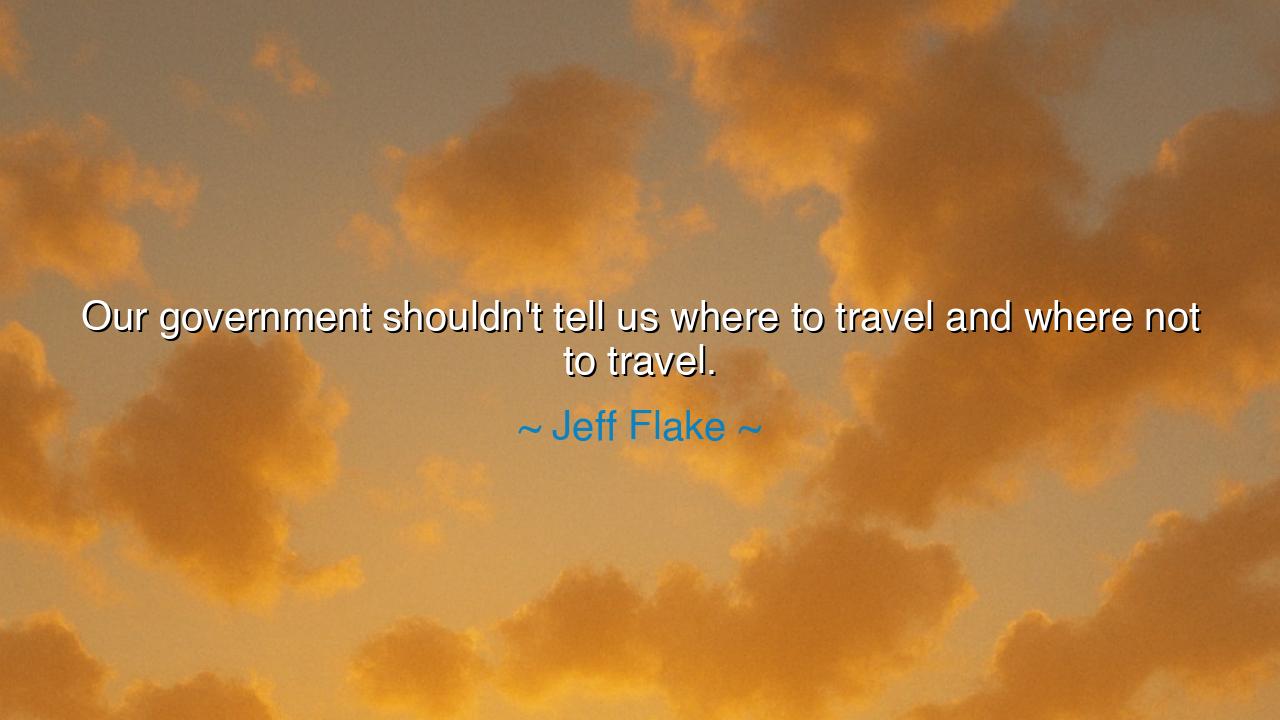
Our government shouldn't tell us where to travel and where not






Jeff Flake once declared with firmness of spirit: “Our government shouldn’t tell us where to travel and where not to travel.” In these words resounds the eternal struggle between liberty and authority, between the yearning of the human soul for freedom and the tendency of rulers to impose boundaries. Travel, he reminds us, is not only the movement of the body but the expression of the will. To say where a man may or may not go is not merely to regulate his steps, but to claim dominion over his very freedom.
The ancients knew this well. When the Athenians cast off the tyranny of Peisistratus, they proclaimed the right of the citizen to move, to speak, to gather knowledge without chains. The Spartans, though rigid in their own ways, still held that a man must be free to walk where duty or curiosity led him. To restrict travel was to shackle not only the body, but the mind, for a man who cannot see other lands, cannot meet other peoples, cannot hear other tongues, soon grows small in vision. Flake’s words echo this ancient warning: that governments must not claim the power to shrink the horizons of their people.
Consider the story of the Berlin Wall. For decades it stood not only as stone and wire, but as a wound carved into the heart of a people. Families were divided, friends separated, opportunities denied. The East German state declared where one could travel and where one could not. But the human soul rebelled. Men and women tunneled beneath, flew over in fragile balloons, and even died upon its shadowed edge—all for the right to walk freely across the earth. Their sacrifice teaches us that freedom of movement is as essential as breath.
Flake’s statement, though made in the halls of modern politics, is born from this long lineage of struggle. When a government dictates where one may go, it assumes that the citizen is a child, unfit to choose his own path. Yet the ancient philosophers taught that dignity lies in the power to choose—even wrongly. To forbid travel in the name of safety, or politics, or ideology, may seem wise for a moment, but it breeds weakness and dependence. True strength is born when the people are trusted to bear the weight of their own choices.
There is also a deeper wisdom here about understanding the world. Travel is not only leisure, but education. To walk foreign streets, to share bread with strangers, to see how others live, is to expand the heart. Governments that forbid this seek not to protect their people, but to control their minds, to prevent them from seeing truths that might challenge the power of rulers. Thus, Flake’s words remind us: to defend the freedom of travel is also to defend the freedom of thought.
The lesson is clear: guard your liberty of movement. Do not surrender it lightly, nor accept without question the dictates of those who would confine you. History shows that when governments claim the right to control travel, they seldom relinquish it, and the people grow smaller while the state grows vast. Freedom is not preserved by comfort, but by vigilance, by the insistence that no man or woman is too fragile to walk their own road.
Practically, this means cherishing and exercising the right to travel. Visit lands near and far. Learn from those who live differently. Speak against any power that would close doors or build barriers for the sake of control. Teach your children that to walk freely upon the earth is not only a pleasure, but a birthright.
Thus, Jeff Flake’s words join the chorus of the ancients: the road belongs to the people. Let no ruler claim it as their own. For as long as men and women can walk where they will, they are free—and when that freedom is taken, no chains are stronger. Guard it, cherish it, and live by it, for the road is the lifeblood of liberty.






AAdministratorAdministrator
Welcome, honored guests. Please leave a comment, we will respond soon